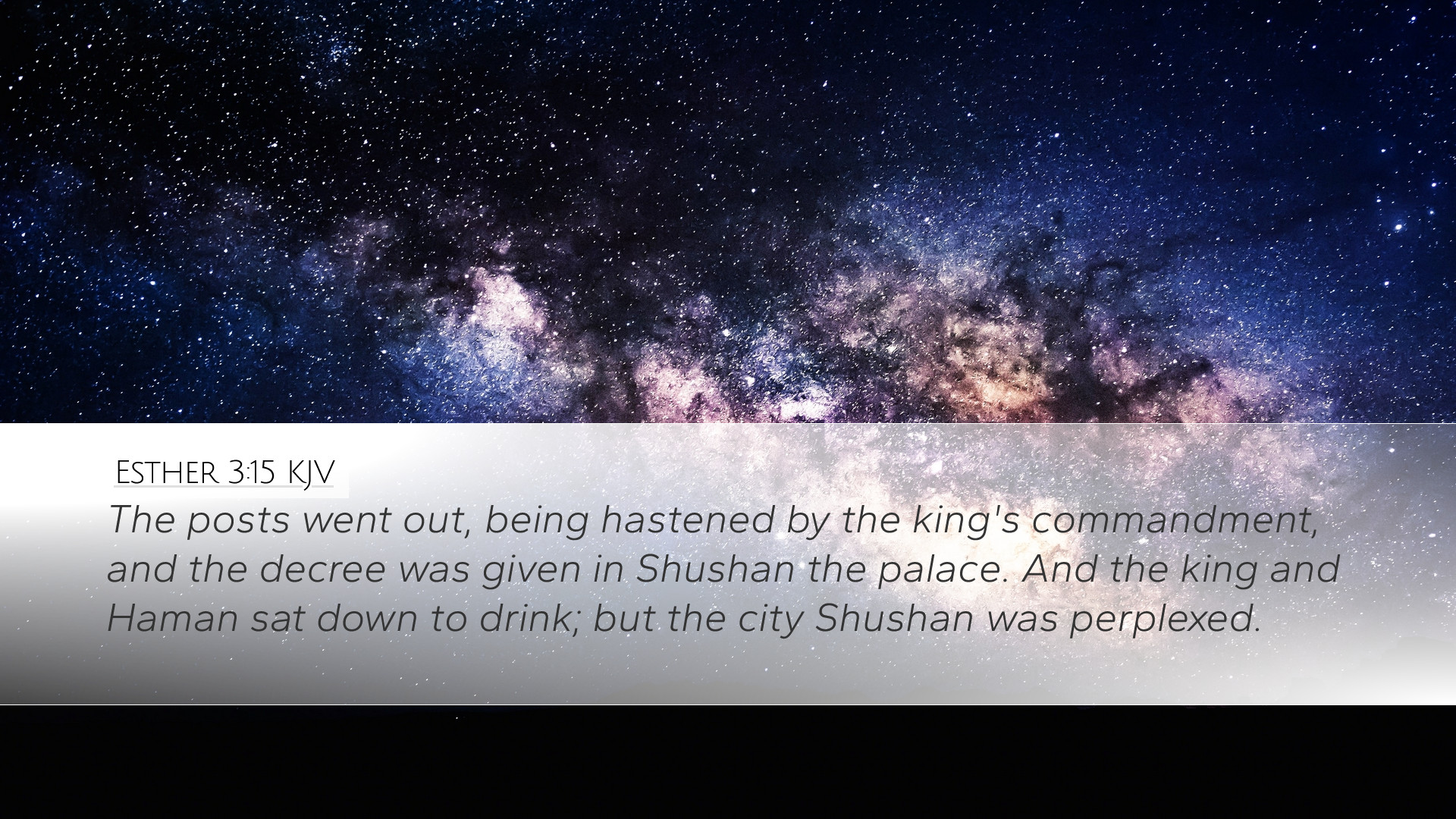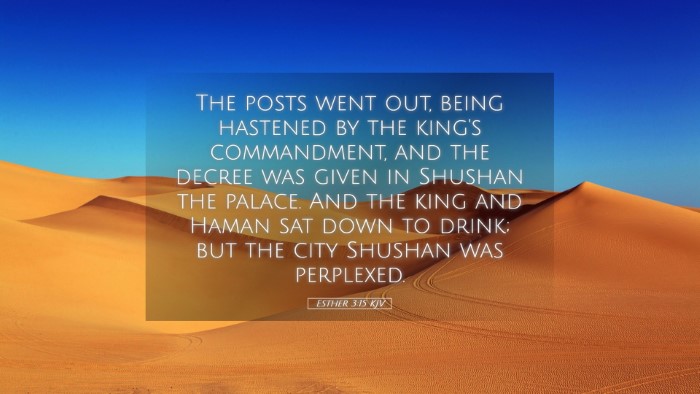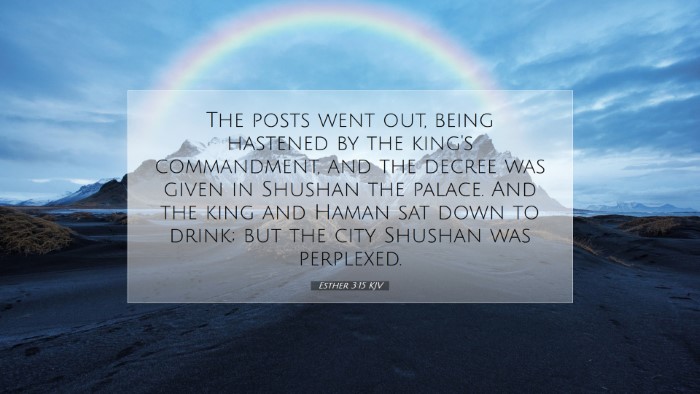Old Testament
Genesis Exodus Leviticus Numbers Deuteronomy Joshua Judges Ruth 1 Samuel 2 Samuel 1 Kings 2 Kings 1 Chronicles 2 Chronicles Ezra Nehemiah Esther Job Psalms Proverbs Ecclesiastes Song of Solomon Isaiah Jeremiah Lamentations Ezekiel Daniel Hosea Joel Amos Obadiah Jonah Micah Nahum Habakkuk Zephaniah Haggai Zechariah MalachiEsther 3:15
Esther 3:15 KJV
The posts went out, being hastened by the king's commandment, and the decree was given in Shushan the palace. And the king and Haman sat down to drink; but the city Shushan was perplexed.
Esther 3:15 Bible Commentary
Commentary on Esther 3:15
Bible Verse: Esther 3:15 - "The couriers went out, spuried on by the king's command, and the decree was proclaimed in the citadel of Susa. The king and Haman sat down to drink, but the city of Susa was bewildered."
Introduction
The events of Esther 3:15 mark a pivotal moment in the narrative of the Book of Esther. The decree that Haman orchestrated against the Jews was not merely a political move but carried deep spiritual and theological implications. This commentary synthesizes insights from esteemed commentators such as Matthew Henry, Albert Barnes, and Adam Clarke to understand the broader context and implications of this pivotal verse.
Contextual Background
Esther's story unfolds during the Persian Empire, highlighting themes of providence, identity, and the struggle against oppression. Haman’s malicious plot against the Jews is ignited by his personal hatred for Mordecai, culminating in a royal decree that threatened the annihilation of an entire people.
Political Intrigue
Haman, elevated to a position of power, exemplifies pride and ambition. His actions reveal how personal grievances can morph into broader conspiracies threatening innocent lives. The decree's swift proclamation reflects the king's unsuspecting complicity and the dangerous game of politics in the ancient world.
Theological Insights
Divine Providence
This verse starkly contrasts the drunken merriment of the king and Haman with the bewilderment of the citizens of Susa. It serves as a reminder of God's overarching sovereignty, where human plots, irrespective of their power and magnitude, cannot thwart divine purpose.
Human Response to Evil
Henry notes that the phrase "but the city of Susa was bewildered" underscores a communal reaction to evil that often shocks the conscience. The Jewish community's impending doom reflects the moral implications of passivity in the face of injustice while reinforcing the call for corporate lament and action.
Commentary Excerpts
Matthew Henry
Henry highlights the absurdity of the king and Haman’s celebration amidst widespread despair. He remarks that "While the friends of Haman feast, the city feels the heavy hand of uncertainty." This juxtaposition illustrates the stark reality where the powerful often remain oblivious to the suffering they inflict.
Albert Barnes
Barnes reflects on the significance of the decree and the role of the couriers. He emphasizes that "The swift action reflects the urgency of evil and its pernicious effects on society." This notion encourages readers to remain vigilant, as evil often masquerades as legitimate authority, driving home the truth of Matthew 5:16 to shine light upon darkness.
Adam Clarke
Clarke keenly observes the reaction of the people, noting that "Their bewilderment symbolizes the chaos that follows when the decree of death is signed against God's people." Clarke insists on the importance of understanding the emotional toll and societal chaos that oppressive laws can inflict, urging believers to remain steadfast in faith and community solidarity.
Practical Applications
- Awareness of Social Injustice: Leaders and believers alike must remain vigilant against laws and actions that marginalize and oppress.
- Unity in Adversity: The narrative calls for communal responses to injustice, emphasizing the need for the church to come together in prayer and action.
- Sovereignty of God: As believers reflect on these events, they embrace the assurance that God remains sovereign, able to turn the tides of despair into deliverance.
Conclusion
Esther 3:15 is a critical turning point that exposes the reality of human sin and divine providence. The seeming triumph of evil is met with divine resistance, reminding readers that while humanity may conspire in darkness, God’s light will illuminate and guide His people through seemingly hopeless situations. As pastors, students, theologians, and scholars reflect on this narrative, they find not only a cautionary tale but also a source of hope and encouragement amidst adversity.


